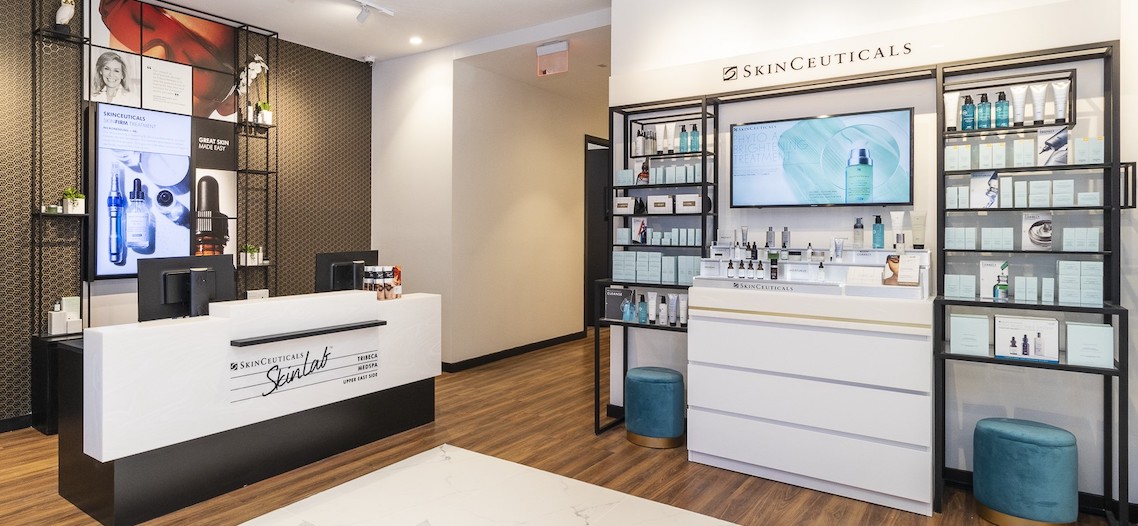Clinical skin-care brand SkinCeuticals is expanding its approach to clinical skin-care sales as it ramps up its SkinLab storefronts.
In February, SkinCeuticals opened two hybrid storefronts-slash-facial service clinics in New York City and Miami, each called SkinCeuticals SkinLab. Initially begun in 2020, the SkinCeuticals brand has 10 locations, including in Charleston, SC and Houston, TX. The New York City and Miami locations are the first new locations to open in 2022, and SkinCeuticals plans to open five additional locations this year.
SkinCeuticals has 130 existing specialty retail and display-focused partnerships with doctors’ offices, which it’s developed over the last five years.
SkinLab takes this concept further with standalone retail and service spaces. For the company, it serves as a long-term customer acquisition strategy and boosts customer lifetime value, said Stephanie Kramer, global gm of SkinCeuticals. Kramer declined to state what percentage of the brand’s sales come from doctor office sales. But, she said, sales distribution in 6,000 offices is “core” to the brand and SkinLab expects to be a significant revenue driver.
“Through extensive research, we discovered that a modern environment tailored to [people] on-the-go, and with credibility and access to a professional, ranked high in importance to consumers,” said Kramer. “These retail-focused, high-traffic locations, which are owned and operated by our physician partners, allow our doctors to connect with a new base of skin-care enthusiasts that may become lifelong patients along with loyal customers.”
SkinCeuticals’ move to rapidly open up additional SkinLab locations occurs during the backdrop of growing competition within the professional and clinical skin-care category. In July 2021, Dermalogica enhanced its e-commerce by adding a virtual reality component to show its latest products, as did Image Skincare in February. Meanwhile, Galderma acquired clinical brand Alastin Skincare in Oct. 2021 to compete with AbbVie’s (which owns Allergan) Skinmedica brand. Then in Nov. 2021, Obagi was bought by the SPAC Waldencast Acquisition Corp., which also acquired Milk Makeup and owns Whind. Meanwhile, Scott Glenn, a co-founder of SkinMedica and Alastin Skincare, helped launch a new “subtopical” skin-care brand called Ourself in February, though its distribution is still to be determined.
In addition to services for hydrafacials, microneedling and LED therapy, SkinLab offers visitors the opportunity to receive injectable services like neuromodulators, fillers and laser treatments under the care of the physician partner.
“SkinLab allows SkinCeuticals to take other technologies and introduce them to complement what they’ve already created,” said Dr. Marisa Garshick, a New York City-based dermatologist at MDCS Dermatology group, which sells SkinCeuticals products among other brands. “By using an LED therapy, it’s making their chemical peel [product] a little bit more effective. Or by doing a HydraFacial in conjunction with their MicroPeel solution, you’re creating a more enhanced result. SkinLab is trying to take a streamlined approach to skin care, in general, and create this idea of a one-stop shop for patients.”
Clinical products have regained favor among consumers since 2020, after years of trends favoring clean and organic brands. Kramer said SkinLab’s target consumers are young and “value accessibility, convenience and personalization,” but declined to share specific demographics.
“The demand that SkinCeuticals SkinLab meets is that of the new-to-aesthetics, often the on-the-go consumer who seeks convenience without sacrifice,” said Kramer.




